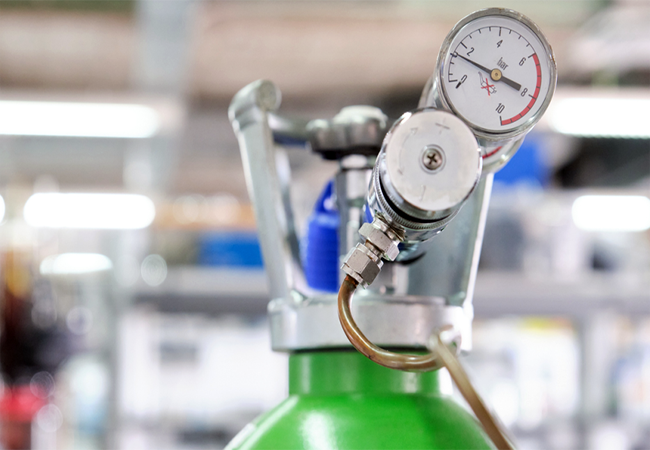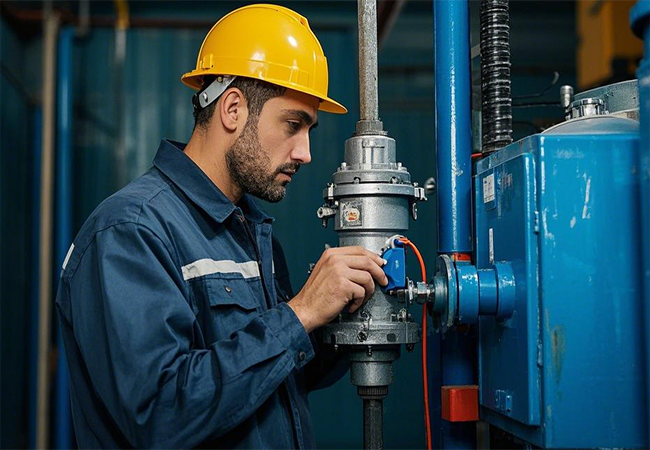Air compressors are indispensable tools in numerous industries, from manufacturing and automotive to construction and home workshops. They convert power into compressed air, which is then used to perform work or power various tools and equipment.
There are several types of air compressors including reciprocating, rotary screw, centrifugal, scroll, diaphragm, and dynamic compressors. Each type of compressor serves distinct functions and suits different applications. Reciprocating compressors work best for small-scale operations, while rotary screw compressors excel in continuous industrial use. Centrifugal and axial compressors manage high flow rates and handle large-scale processes. Understanding these types helps you choose the best compressor for your specific needs
With a variety of types available, each designed for specific applications, understanding these differences can help you make an informed decision when selecting the right compressor for your needs. This guide explores the main types of air compressors, their unique characteristics, advantages, and applications.
How Air Compressors Work
To fully grasp the diverse types of air compressors and their applications, it is essential to first understand how they operate. Air compressors function by converting mechanical energy into compressed air. The core components include a motor, pump, tank, regulator, and control systems. The basic principle involves drawing air into a chamber, compressing it, and then storing it in a tank. This compressed air can then be used to power tools, equipment, or processes.
With this foundational understanding, we can now delve into the different types of air compressors and explore how each type works to meet various needs.
Types of Air Compressors
Air compressors come in several types, each suited to different applications and operational requirements. Below, we will explore these types in detail, starting with the most common and widely used types and moving towards those designed for specific, high-demand applications.
Reciprocating Compressors
Reciprocating compressors are the most common type of air compressors. They use a piston to compress air, operating on a back-and-forth motion. These compressors are known for their reliability and simplicity.
- Single-Stage Compressors: Compress air in one stroke of the piston, making them suitable for lower pressure requirements.
- Two-Stage Compressors: Compress air in two strokes, making them ideal for higher pressure needs.
Advantages: These compressors are cost-effective and efficient for intermittent use. They are also relatively easy to maintain.
Disadvantages: They can be noisy and require regular maintenance to ensure optimal performance.
Applications: Commonly used in home workshops, small manufacturing settings, and automotive repair, reciprocating compressors are versatile and affordable solutions for various needs.
As we transition from reciprocating compressors, let’s explore rotary screw compressors, which are engineered for continuous, high-demand operations and offer a different set of benefits and applications.
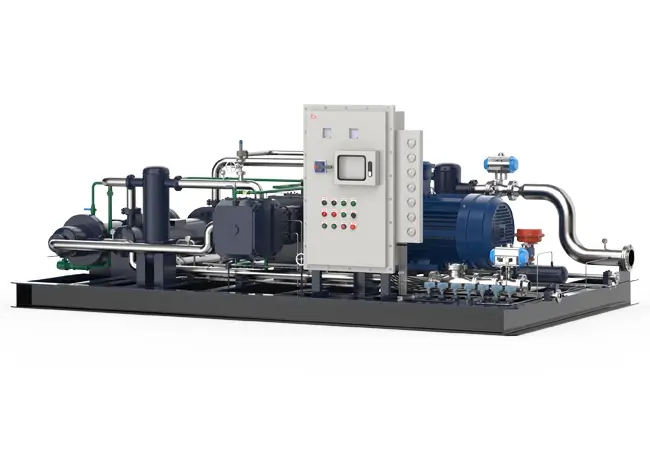
Rotary Screw Compressors
Description: Rotary screw compressors utilize two interlocking helical screws to compress air. They are designed for continuous operation and are known for their efficiency and reliability.
- Oil-Flooded: Uses oil to lubricate and cool the screws, providing a cost-effective solution for many applications.
- Oil-Free: Employs alternative methods to avoid oil contamination, making them suitable for applications requiring clean air.
Advantages: These compressors are ideal for continuous operation and offer lower noise levels compared to reciprocating compressors.
Disadvantages: They come with a higher initial cost and require more complex maintenance.
Applications: Commonly found in industrial settings, large-scale operations, and continuous processes where high efficiency and reliability are crucial.
Next, let’s delve into centrifugal compressors, which are designed for high-flow applications and large-scale industrial processes. These compressors use a different mechanism to achieve high efficiency and capacity.
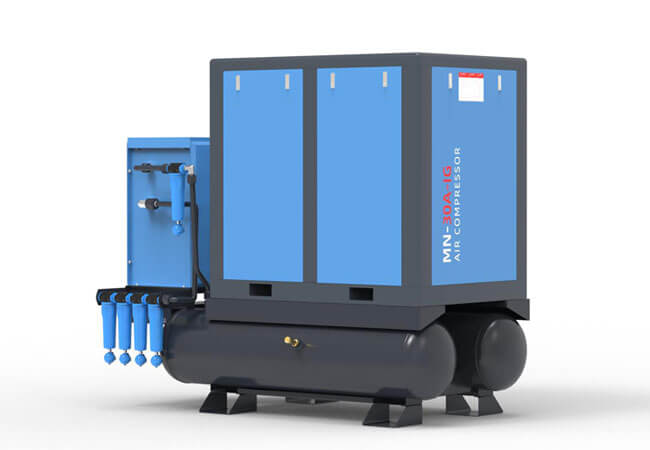
Centrifugal Compressors
Centrifugal compressors use a rotating impeller to increase the velocity of the air, which is then converted into pressure. This design is suited for applications requiring high flow rates and continuous operation.
- Single-Stage: Utilizes one set of impellers for moderate pressure increases.
- Multi-Stage: Employs multiple sets of impellers to achieve higher pressures.
Advantages: They offer high efficiency and capacity, making them ideal for large industrial processes.
Disadvantages: Centrifugal compressors are expensive and require high-speed operation, which can lead to higher maintenance costs.
Applications: Used in large industrial processes, HVAC systems, and power generation, these compressors are essential for applications demanding high flow rates and continuous operation.
Following the centrifugal compressors, we will explore scroll compressors. These compressors are known for their quiet operation and compact design, making them suitable for a range of applications where noise and space are concerns.
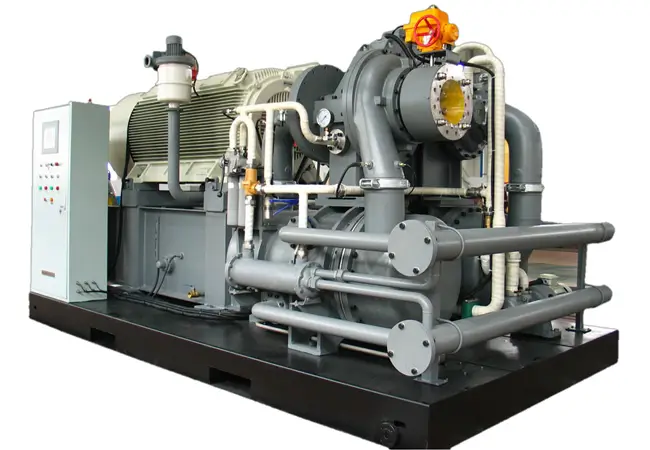
Scroll Compressors
Scroll compressors use two interlocking spiral-shaped scrolls to compress air. They are appreciated for their compact size and quiet operation.
- Fixed Displacement: Provides a constant output of compressed air.
- Variable Displacement: Adjusts the output based on demand, offering greater flexibility.
Advantages: Scroll compressors are known for their quiet operation and compact design, making them ideal for applications where space and noise are factors.
Disadvantages: They come with a higher cost and are generally limited in capacity compared to other types.
Applications: Commonly used in air conditioning systems, refrigeration, and small to medium industrial applications where space and noise are considerations.
We now move on to diaphragm compressors, which are particularly useful in sensitive applications requiring clean, contaminant-free air. Their unique design ensures that they meet specific needs in industries such as medical and laboratory settings.
Diaphragm Compressors
Diaphragm compressors utilize a diaphragm to compress air. This design is favored for its ability to deliver clean, oil-free air.
Advantages: Ideal for applications where the purity of compressed air is critical, such as medical and laboratory environments.
Disadvantages: They have a lower capacity compared to other types and may require more maintenance.
Applications: Common in medical, laboratory, and food processing industries where contamination must be avoided.
Finally, let’s discuss dynamic compressors, which include both centrifugal and axial compressors. These compressors are designed for high-flow applications and offer specific advantages for large-scale and high-demand processes.
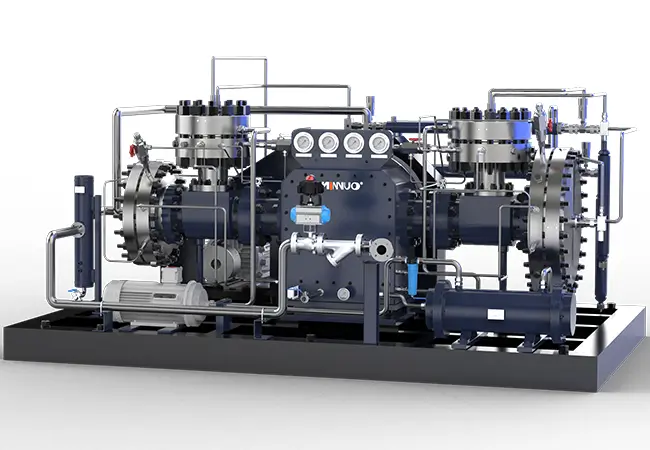
Dynamic Compressors
Dynamic compressors use high-speed rotating elements to compress air. They are designed for applications requiring high flow rates and continuous operation.
- Centrifugal Compressors: Previously discussed, they utilize rotating impellers.
- Axial Compressors: Use rotating blades to accelerate air along the axis, suitable for very high flow rates.
Advantages: High efficiency and capability for continuous operation at high flow rates.
Disadvantages: They come with a high initial cost and complex maintenance requirements.
Applications: Used in HVAC systems, aerospace applications, and large-scale industrial processes where high flow rates are necessary.
Selecting the Right Air Compressor
With a comprehensive understanding of the different types of air compressors, the next step is selecting the right one for your specific needs. Choosing the appropriate compressor involves considering several key factors to ensure that you meet both performance and cost requirements.
Factors to Consider
- Required Pressure and Flow Rate: Determine the specific pressure and flow rate needed for your application to ensure optimal performance.
- Environment and Space: Consider the installation environment and available space to select a compressor that fits comfortably and operates effectively.
- Budget and Cost of Operation: Evaluate both the initial cost and ongoing operational expenses to find a compressor that fits your budget.
Matching Compressor Type to Application:
- Home Workshops: Reciprocating or small scroll compressors are typically suitable for personal use and smaller projects.
- Industrial Settings: Rotary screw or centrifugal compressors are ideal for continuous, high-demand operations.
- Sensitive Applications: Diaphragm compressors are preferred for applications requiring clean, contaminant-free air.
Maintenance and Troubleshooting
Proper maintenance is crucial for the longevity and efficiency of your air compressor. Each type of compressor has specific maintenance needs and common issues that may arise.
Regular Maintenance:
- Reciprocating Compressors: Regularly check oil levels, replace filters, and inspect components.
- Rotary Screw Compressors: Monitor oil quality, perform routine inspections, and address any issues promptly.
- Centrifugal Compressors: Maintain impellers, ensure proper cooling, and check for system leaks.
- Scroll Compressors: Inspect for wear and tear, and perform regular cleaning.
- Diaphragm Compressors: Replace diaphragms as needed and check seals for integrity.
Common Issues and Solutions:
- Leaking Air: Identify and seal leaks to maintain efficiency.
- Excessive Noise: Investigate for worn components or loose parts and address them accordingly.
- Reduced Performance: Ensure proper maintenance, check for blockages, and make necessary adjustments.
Conclusion
Understanding the various types of air compressors and their applications helps in selecting the right one for your specific needs. Whether for a small workshop or a large industrial process, choosing the appropriate compressor ensures efficiency, reliability, and cost-effectiveness. By considering the factors outlined and following proper maintenance practices, you can maximize the performance and lifespan of your air compressor.
Minnuo Air Compressors
For high-quality air compressors that meet diverse needs, consider Minnuo. At Minnuo, we specialize in manufacturing a wide range of air compressors designed to deliver superior performance, reliability, and efficiency. Our products cater to various applications, from home workshops to industrial processes. Whether you require a robust rotary screw compressor for continuous operation or a versatile reciprocating compressor for home use, Minnuo has the right product for you.
Experience the difference with Minnuo’s state-of-the-art technology and dedicated customer support. Contact us today to learn more about our products and how they can enhance your operations.
FAQs
For home use, reciprocating or small scroll compressors are typically ideal due to their affordability and efficiency for intermittent use.
Oil-free compressors use air or other methods for lubrication, making them suitable for applications requiring clean air. Oil-flooded compressors use oil for lubrication, which can lead to a higher level of maintenance but usually offers better efficiency for continuous operations.
The four main types of compressors are:
Reciprocating Compressors: Use pistons to compress air or gas in a cylinder.
Rotary Screw Compressors: Utilize two interlocking screws to compress air or gas.
Centrifugal Compressors: Employ a rotating impeller to increase the velocity of the air or gas, converting it to pressure.
Scroll Compressors: Feature two spiral-shaped scrolls, where one scroll orbits the other to compress the air or gas.
Each type has distinct applications based on factors like pressure, flow rate, and efficiency.



